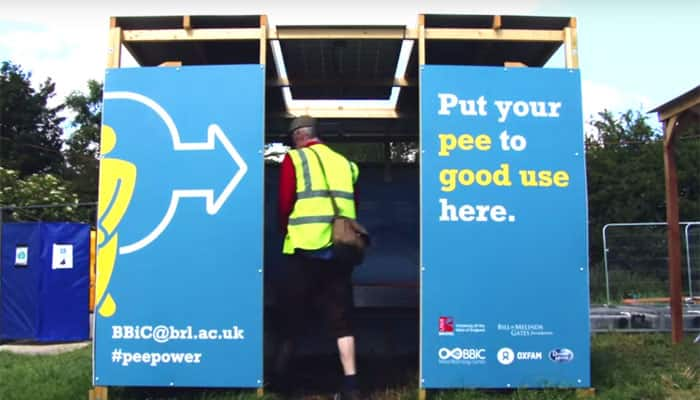London: In a major scientific breakthrough, researchers at the University of the West of England (UWE) have succeeded in developing a urinal that can transform urine into electricity with the help of bacterial metabolism.
The innovation is likely to be a big boon for power-deficient countries like India where the rate of electricity consumption is much higher as compared to its generation by various power plants.
According to a report in the India Today, researchers installed a public urinal (test cubicle) this year at Glastonbury festival to show how it can generate enough electricity to light the cubicle's LED tubes.
This public urinal was tested by thousands of users per day during the Glastonbury festival. Their final aim, however, is improving sanitation facilities in developing countries and in areas with limited electricity generation like refugee camps, researchers said.
"The technology in the prototype is based on microbial fuel cells (MFC), which, like batteries, has an anode and a cathode," Irene Merino, one of the researchers was quoted as saying.
The cells are installed inside a container which collects the urine, currently only from male users due to the design of the urinals. Inside, bacteria colonise the anode electrode and act as a catalyst, decomposing the organic material in the urine.
This decomposition releases both protons, which travel from the anode to the cathode across a semi-permeable membrane, and electrons, which travel through an external electrical circuit.
To complete the cycle, an oxygen reduction reaction also takes place in the cathode. The process generates enough energy to power light bulbs or LED tubes.
Apart from Glastonbury festival, researchers also tested their cubicle at the university campus, with limited number of participants. In both experiments, the electricity generated was used to illuminate the interior of the cubicle where the urinal was installed.
Buoyed by their success, the researchers are now planning to test these urinals in India or in some regions of Africa, specifically, at refugee camps, in communities, at schools and in public toilets that lack lighting.
"The ultimate purpose is to get electricity to light the toilets, and possibly also the outside area, in impoverished regions, which may help improve the safety of women and children, in countries where they have to use communal toilet facilities outside their homes," professor Ioannis Ieropoulos, the Director of the Bristol BioEnergy Centre at UWE was quoted as saying.
This amazing innovation by the researchers of UWE was also published in the journal Environmental Science: Water Research and Technology.
Watch here how thousands tested the newly created public urinal.
















